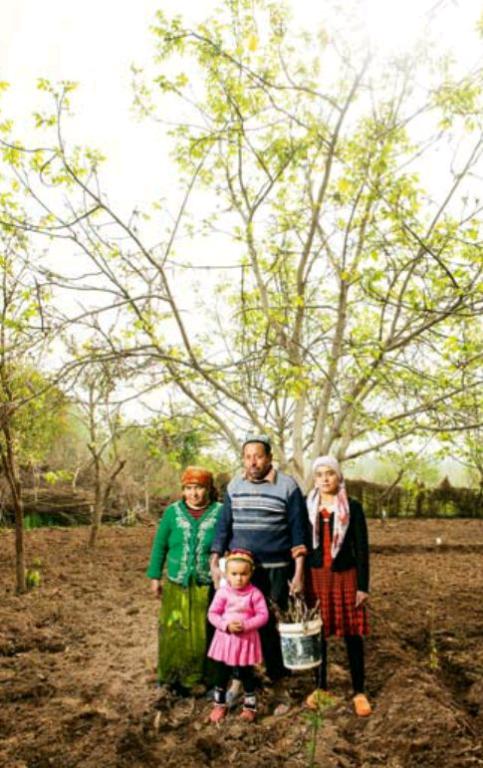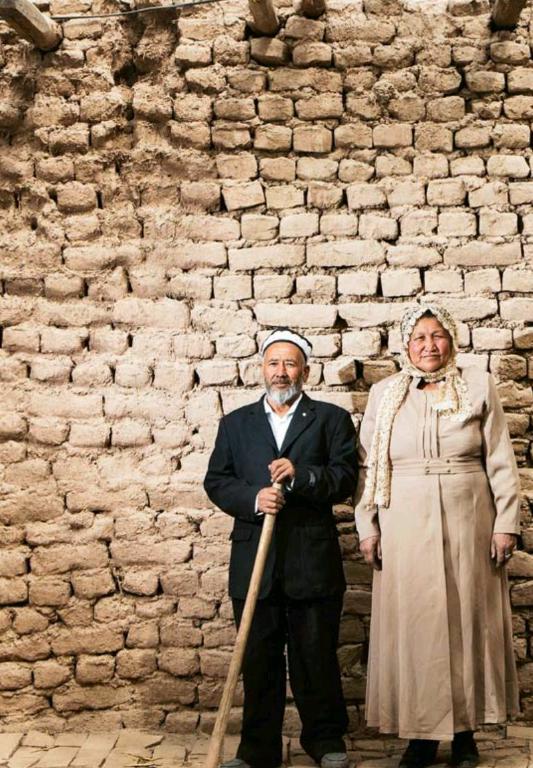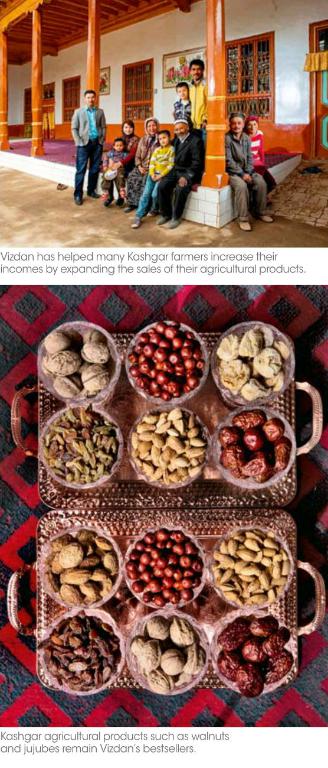New Market
by+Fan+Xia
About 3 p.m. on Friday, the Islamic day of Jumuah, lo- cal Uygur Amu stepped out of his office at a two-story building in urban Kashgar, Xinjiang Uygur Autonomous Region, carrying a small piece of carpet. He headed for a mosque 300 meters away to attend a prayer service. Every Friday, male Muslims gather at the mosque to pray together. Upon his arrival, the building was already packed with worshipers, so Amu joined the crowd outside the mosques gate. Hundreds of carpets were unfolded in rows, on which Muslims knelt and prayed silently, with bare feet. Everything else was secondary to religious devotion, and life seemed to stop for the moment.
As Amu prayed outside the mosque, three of his colleagues –Han 20-somethings – stayed at the office of Vizdan Trading Co., Ltd. Founded by Amu and his partners from the Han ethnic group in March 2012, the firm is an e-commerce company specializing in sales of Xinjiang specialties such as walnuts and jujubes.
Volunteer to Entrepreneur
Born in 1986, Amu once worked for Kashgar Customs. He quit his job in autumn 2011 and volunteered for a charity campaign aiming to help the disabled in Xinjiang. When Han volunteers visited local Uygur families, Amu acted as their interpreter. Through this endeavor, he met Liu Jingwen, a social worker from the southeastern coastal city of Shenzhen. Liu discovered that local farmers lacked channels to sell their products despite their high quality.
In November 2011, Liu and Amu opened an online shop to sell local specialties from Kashgar. Lius wife, Zhang Ping, eventually came to visit and ended up staying to help. They named their store Vizdan, meaning “conscience” in Uygur. “Many Uygur farmers still plant and store agricultural products in traditional ways,” explains Liu. “They believe foods are gifts bestowed by Allah, so no questionable treatment of food is allowed. This concept has been the heart of our brand since the very beginning.”
Local farmer Tursunjan was one of their first suppliers. He brought 300 kilograms of walnuts his household had harvested and entrusted Vizdan to sell them. Previously, he waited at home for wholesalers to find him. “Tursunjan didnt ask for pay before his walnuts were sold on our online store,” recalls Amu. Sooner than expected, the 300 kilograms of walnuts were gone within the month.
Their initial intention with the online store was to help local farmers, and they never imagined making fat profits for themselves. To their surprise, Vizdans sales reached 300,000 yuan in three months, with product categories expanding to a dozen. The team decided to launch a trading company. “I finally found the career I enjoy from the bottom of my heart,” declares Amu.
On March 21, 2012, Amu, Liu Jingwen, Zhang Ping, and two other volunteers from elsewhere in China – Chen Junjun and Xiang Jun – launched Vizdan Trading Co., Ltd., through which they sell Xinjiang products in the commercial market.
The first step the company took was to increase its supply. Employees visited local farmers homes to search for special products. They signed contracts with farmers to purchase or reserve such products and sell them online. Currently, Vizdans monthly sales total some 500,000 yuan.

Expanding
When it was first founded, Vizdan faced many challenges. At first, it delivered goods directly from Kashgar. Due to Xinjiangs uncontrollable factors like transportation and climate conditions, shipping efficiency was so poor that some buyers canceled. “Some even snarked that we were delivering by donkey,” recalls Amu. Upon the advice of a friend, they started shipping goods in bulk to a Beijing warehouse, where they could better distribute to buyers. Vizdans delivery efficiency was improved considerably.
Vizdan has established a close relationship with farmers, stronger than the normal relationship between producer and distributor. In addition to information about agricultural products, the online retailer also posts stories about their growers. This enables consumers to not only learn about the farmers, but also track the origins of the products they buy. Through this practice, Vizdan established a reputation as a retailer of safe food.
Now, Vizdans suppliers are not only from Kashgar, but all of Xinjiang. Along with food such as Yining honey, Hotan jujubes, and Turpan raisins, they also vend handicrafts such as lavender sachets and Idili silk table cloths. This year, its commodity categories will reach 65. “Weve established 31 purchasing outlets around Xinjiang and will open offices in Turpan and Yining this year,”announces Liu Jingwen.
Except for Amu, all founding members of Vizdan have left Kashgar. Liu Jingwen and his wife, Zhang Ping, returned to Shenzhen after their charity program ended in 2012. Liu resumed his career as a journalist, but still serves as an advisor for Vizdan. Zhang remains CEO of Vizdan. In May 2013, she registered Vizdan Eco-Agriculture Co., Ltd. to promote product sales.
Vizdans Kashgar office now employs four. The three besides Amu all joined last year. Liu Fang is responsible for managing local farmers, Zhang Ya handles financial affairs, and Li Yumeng is in charge of online marketing. To them, Kashgar is a place far away from their hometowns, but also a land of dreams. Liu Fang reveals that the reason she joined is she “likes to do things related to land.”
Despite its limited size, Vizdan has set a successful model for Xinjiangs future development: Take advantage of the internet to bridge Uygur farmers in Chinas remotest rural areas to the outside world and help them increase incomes. Online retailers like Vizdan are, in some sense, changing modern realities of Xinjiang.
China Pictorial2014年6期
